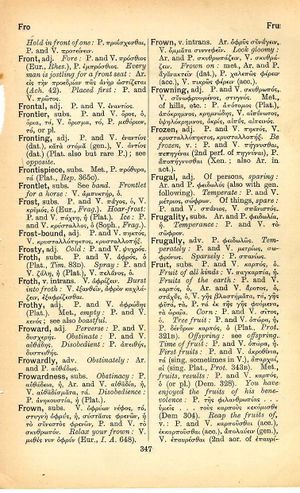fruit: Difference between revisions
συνετῶν μὲν ἀνδρῶν, πρὶν γενέσθαι τὰ δυσχερῆ, προνοῆσαι ὅπως μὴ γένηται· ἀνδρείων δέ, γενόμενα εὖ θέσθαι → it is the part of prudent men, before difficulties arise, to provide against their arising; and of courageous men to deal with them when they have arisen
m (Woodhouse1 replacement) |
mNo edit summary |
||
| Line 7: | Line 7: | ||
[[fruit of all kinds]]: [[verse|V.]] [[παγκαρπία]], ἡ. | [[fruit of all kinds]]: [[verse|V.]] [[παγκαρπία]], ἡ. | ||
[[fruits of the earth]]: [[prose|P.]] and [[verse|V.]] [[καρπός]], ὁ, [[Aristophanes|Ar.]] and [[verse|V.]] [[ἄροτος]], ὁ, [[στάχυς]], ὁ, [[verse|V.]] [[γῆς βλαστήματα]], τά. [[γῆς φυτά]], τά, [[prose|P.]] | [[fruits of the earth]]: [[prose|P.]] and [[verse|V.]] [[καρπός]], ὁ, [[Aristophanes|Ar.]] and [[verse|V.]] [[ἄροτος]], ὁ, [[στάχυς]], ὁ, [[verse|V.]] [[γῆς βλαστήματα]], τά. [[γῆς φυτά]], τά, [[prose|P.]] [[τὰ ἐκ τῆς γῆς φυόμενα]], [[τὰ ὡραῖα]]. | ||
[[corn]]: [[prose|P.]] and [[verse|V.]] [[σῖτος]], ὁ. | [[corn]]: [[prose|P.]] and [[verse|V.]] [[σῖτος]], ὁ. | ||
Revision as of 19:56, 7 June 2020
English > Greek (Woodhouse)
substantive
fruit of all kinds: V. παγκαρπία, ἡ.
fruits of the earth: P. and V. καρπός, ὁ, Ar. and V. ἄροτος, ὁ, στάχυς, ὁ, V. γῆς βλαστήματα, τά. γῆς φυτά, τά, P. τὰ ἐκ τῆς γῆς φυόμενα, τὰ ὡραῖα.
tree fruit: P. and V. ὀπώρα, ἡ. P. δένδρων καρπός, ὁ (Plato, Protagoras 321B).
time of fruit: P. and V. ὀπώρα, ἡ.
first fruits: P. and V. ἀκροθίνια, τά (sing. sometimes in V.), ἀπαρχαί, αἱ (sing. Plato, Protagoras 343B).
Met., fruits, results: P. and V. καρπός, ὁ (or pl.) (Dem. 328).
you have enjoyed the fruits of his benevolence: P. τῆς φιλανθρωπίας… ὑμεῖς… τοὺς καρποὺς κεκόμισθε (Dem 304).
reap the fruits of, v.: P. and V. καρποῦσθαι (acc.), ἐκκαρποῦσθαι (acc.), ἀπολαύειν (gen.), V. ἐπαυρέσθαι (2nd aor. of ἐπαυρίσκειν) (gen.), καρπίζεσθαι (acc.) (Eur., Hippolytus 432).
bear fruit: V. καρποῦν (acc.).
Met., be of advantage: P. and V. ὠφελεῖν.
result: P. and V. συμβαίνειν, P. περιγίγνεσθαι.
now the curse bears fruit: V. νῦν ἀραὶ τελεσφόροι (Aesch., Seven Against Thebes 655).

